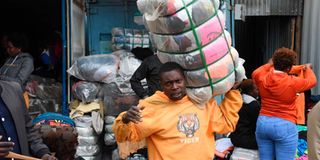Mitumba: Elite ideology, need for pragmatism

A mitumba trader.
To ban or not to ban? That is the question—about trade and consumption of mitumba (second-hand clothes). It’s one of the hottest topics in Kenya’s social spaces but would not have been had Azimio presidential candidate Raila Odinga not pronounced himself on mitumba.
Mitumba is weaved into our national lifestyle—dressed millions and made billionaires. Last-mile retailers are a sight too. They flock rural markets with treasure and trash. They have also mastered the art of the sweet tongue, complete with a mitumba lexicon. Shopping for mitumba has also become an art, an experience...almost like hunting and gathering. In some places, it requires grit.
But now, Mr Odinga reckons, it’s time for change. His proposal has divided opinion. Yet, the dynamics are complex beyond the simple dichotomy of continue-discontinue. The ‘Discontinue’ brigade is dolling such justification as dignity and industrialisation. The ‘Continue’ argue from the economic (affordability) angle; their savoir-faire see exclusivity. Both divides are brimful of political sycophants.
But how did we end here? Globalisation. Liberalisation that spawned market triumphalism ended years of protectionism and homegrown manufacturing. Most factories moved to East Asia, mainly China. Liberalisation also left behind sprawling rustbelts strewn in formerly robust industrial estates. Globalisation also revolutionised tastes and consumption around the world. Later, the African Growth and Opportunity Act (Agoa) trade framework was pegged on importation of mitumba.
Kenya had its Golden Age of the textile industry but romanticising the past and nostalgia should not mislead us into utopia. Dismantling such a complex juggernaut will be messy and painful. It means toppling the millions of traders in favour of factory owners. Even a revived cotton sector won’t absorb those mitumba millions. Nor will merchandising of new clothes follow the mitumba craft.
From dead people?
But is it true, for instance, that secondhand clothes are from dead people, as Mr Odinga claimed? Not entirely. A rich consumerist world offloads acquisitions, such as clothes, at an industrial scale. That feeds the mitumba sector.
And where is the narrative of dignity and patriotism when millions of compatriots starve to death? Where is patriotism when we perpetually cheer crooks who loot our public coffers, including medicines?
Sorry, I digressed. While it’s great to stand out, still, we go back to the waves of the liberal market. You’ll be lucky to create a national dress. In a globalised world, media influence determines our self-perceptions; thus, our taste is quite strong. A population exposed to movies, the Kardashians and telenovelas will still relish what it sees, as fashion of its idols.
A holistic strategy should end importation of food. Apparels for the local and export markets would be a hanging fruit too. We can only hope the Azimio strategy is distilled. There was a narrative on food, we ended up with Galana Kulalu. We can’t afford another sham project in the name of cotton.
Mr Wamanji is a public relations and communication consultant. [email protected] @manjis





